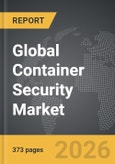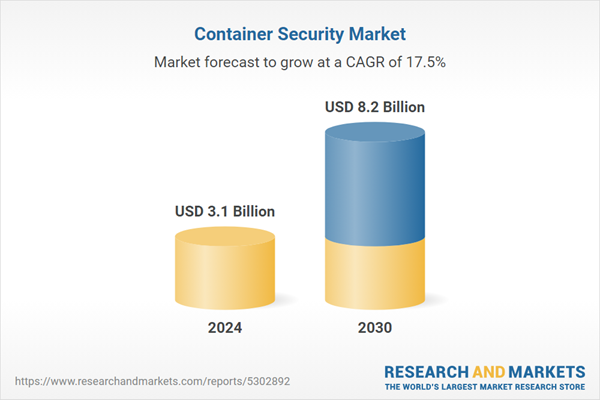Global Container Security Market - Key Trends & Drivers Summarized
What Is Container Security, and Why Is It Essential in Modern DevOps?
Container security is a set of practices and tools designed to protect containers and containerized applications from potential security threats. Containers, which encapsulate software and its dependencies, allow applications to run consistently across various computing environments, making them a core component of modern DevOps and cloud-native application development. However, while containers offer flexibility and scalability, they also introduce unique security challenges, as they often operate in dynamic, multi-cloud or hybrid cloud environments. Traditional security approaches fall short in addressing these challenges, as containers have a short lifecycle, are highly ephemeral, and frequently interact with other containers, services, and networks. This makes container security essential, as it ensures that containers are secure throughout their lifecycle - from build and deployment to runtime.A comprehensive container security strategy includes vulnerability scanning, image validation, runtime protection, and network segmentation. As containers interact with each other in complex ways, security controls are necessary to protect against threats such as unauthorized access, malware, and misconfigurations. Runtime protection, for instance, monitors active containers for anomalies, helping detect suspicious behaviors or privilege escalations in real-time. By securing containers at every stage, organizations can better protect their applications, data, and network resources while maintaining the agility and efficiency that containers bring to DevOps environments. This shift toward robust container security highlights its importance as companies increasingly rely on cloud-native and containerized applications.
How Is Technology Innovation Shaping the Container Security Landscape?
Technological advancements are transforming container security, with new tools and platforms emerging to address the unique challenges posed by containerized environments. Automation and artificial intelligence (AI) play a pivotal role in this evolution, enabling organizations to detect and respond to security threats faster and with higher precision. AI-driven anomaly detection, for instance, can identify unusual behavior in containerized applications, providing early warnings of potential security breaches. Additionally, AI and machine learning (ML) algorithms can help security teams prioritize vulnerabilities based on risk factors, allowing for proactive threat mitigation. This automation is crucial in containerized environments, where hundreds or thousands of containers may be deployed simultaneously, making manual security management impractical.Another significant advancement in container security is the adoption of DevSecOps, an approach that integrates security practices into the DevOps workflow from the start. DevSecOps emphasizes 'shifting left,' where security checks are integrated into the early stages of the development lifecycle, allowing teams to identify and resolve security issues before containers are deployed. Tools that support continuous integration and continuous deployment (CI/CD) pipelines have evolved to include automated security testing, vulnerability scanning, and compliance checks. Additionally, platforms offering visibility across multiple clusters and clouds are becoming essential as organizations scale their containerized deployments. These innovations make it easier for security teams to monitor container activity and address potential threats in real time, aligning with the fast-paced, dynamic nature of containerized environments.
Where Are Containers and Container Security Primarily Used, and How Is Demand Evolving?
Containers and container security solutions are widely used across various industries, including technology, finance, healthcare, retail, and telecommunications. In the technology sector, containerized applications support scalability and rapid deployment, enabling tech companies to bring products to market faster and respond to customer demands more effectively. The finance industry, which requires stringent data security and compliance, uses container security solutions to protect sensitive customer information and transaction data while ensuring compliance with regulations like PCI-DSS and GDPR. Healthcare organizations rely on containers to manage patient data and support telehealth applications, where security is essential to safeguard sensitive information against breaches. With the proliferation of digital services, these sectors are rapidly adopting container security solutions to protect their containerized workloads.As organizations expand their use of multi-cloud and hybrid environments, the demand for container security continues to grow. Containers are inherently portable, which makes them ideal for multi-cloud deployments, but also exposes them to additional security risks across different infrastructures. This has led to an increased need for tools that provide end-to-end visibility and consistent security policies across environments. Additionally, with the surge in remote work and digital transformation, companies are accelerating their cloud-native strategies, further fueling the demand for container security. This shift highlights a growing reliance on security solutions capable of protecting containerized applications at scale, addressing concerns related to data integrity, regulatory compliance, and incident response.
What Factors Drive the Container Security Market's Growth?
The growth in the container security market is driven by several key factors, including the rapid adoption of DevOps, cloud-native applications, and the increasing complexity of multi-cloud and hybrid environments. As more organizations adopt containers to accelerate development and improve scalability, securing these environments has become a top priority. The rise of DevSecOps has further emphasized the importance of embedding security into the development pipeline, where security vulnerabilities can be detected and mitigated early in the process. This 'shift-left' approach has prompted the adoption of automated security solutions within CI/CD pipelines, supporting faster, more secure development cycles.Another major driver is the increase in data breaches and cyberattacks targeting cloud-native applications. Containers are frequently deployed across multiple cloud environments, which increases their exposure to threats and the need for effective security solutions that can manage complex, distributed systems. Regulatory compliance, particularly in industries like finance and healthcare, is also a critical growth driver, as organizations must secure sensitive data to meet standards such as GDPR, HIPAA, and PCI-DSS. Moreover, advancements in security technologies, such as AI-driven threat detection and real-time monitoring, are expanding the capabilities of container security solutions. Finally, the expanding trend of microservices architectures, where applications are built from multiple interdependent containers, further increases the demand for container security solutions that offer visibility and control over these intricate ecosystems. Collectively, these factors are fueling the rapid expansion of the container security market, underscoring the need for robust, scalable, and integrated security solutions to protect the future of cloud-native application development.
Report Scope
The report analyzes the Container Security market, presented in terms of market value (US$ Thousand). The analysis covers the key segments and geographic regions outlined below.- Segments: Component (Products, Services); Deployment (Cloud, On-Premise); Vertical (BFSI, Government, Retail, Healthcare, IT & Telecom, Manufacturing, Other Verticals).
- Geographic Regions/Countries:World; United States; Canada; Japan; China; Europe (France; Germany; Italy; United Kingdom; Spain; Russia; and Rest of Europe); Asia-Pacific (Australia; India; South Korea; and Rest of Asia-Pacific); Latin America (Argentina; Brazil; Mexico; and Rest of Latin America); Middle East (Iran; Israel; Saudi Arabia; United Arab Emirates; and Rest of Middle East); and Africa.
Key Insights:
- Market Growth: Understand the significant growth trajectory of the Products Component segment, which is expected to reach US$3.2 Billion by 2030 with a CAGR of a 12.7%. The Services Component segment is also set to grow at 21.5% CAGR over the analysis period.
Why You Should Buy This Report:
- Detailed Market Analysis: Access a thorough analysis of the Global Container Security Market, covering all major geographic regions and market segments.
- Competitive Insights: Get an overview of the competitive landscape, including the market presence of major players across different geographies.
- Future Trends and Drivers: Understand the key trends and drivers shaping the future of the Global Container Security Market.
- Actionable Insights: Benefit from actionable insights that can help you identify new revenue opportunities and make strategic business decisions.
Key Questions Answered:
- How is the Global Container Security Market expected to evolve by 2030?
- What are the main drivers and restraints affecting the market?
- Which market segments will grow the most over the forecast period?
- How will market shares for different regions and segments change by 2030?
- Who are the leading players in the market, and what are their prospects?
Report Features:
- Comprehensive Market Data: Independent analysis of annual sales and market forecasts in US$ Million from 2024 to 2030.
- In-Depth Regional Analysis: Detailed insights into key markets, including the U.S., China, Japan, Canada, Europe, Asia-Pacific, Latin America, Middle East, and Africa.
- Company Profiles: Coverage of players such as Alert Logic, Anchore, Aporeto, Aqua Security, Black Duck and more.
- Complimentary Updates: Receive free report updates for one year to keep you informed of the latest market developments.
Some of the 34 companies featured in this Container Security market report include:
- Alert Logic
- Anchore
- Aporeto
- Aqua Security
- Black Duck
- Cloudpassage
- Docker
- Guardicore
- Neuvector
This edition integrates the latest global trade and economic shifts into comprehensive market analysis. Key updates include:
- Tariff and Trade Impact: Insights into global tariff negotiations across 180+ countries, with analysis of supply chain turbulence, sourcing disruptions, and geographic realignment. Special focus on 2025 as a pivotal year for trade tensions, including updated perspectives on the Trump-era tariffs.
- Adjusted Forecasts and Analytics: Revised global and regional market forecasts through 2030, incorporating tariff effects, economic uncertainty, and structural changes in globalization. Includes historical analysis from 2015 to 2023.
- Strategic Market Dynamics: Evaluation of revised market prospects, regional outlooks, and key economic indicators such as population and urbanization trends.
- Innovation & Technology Trends: Latest developments in product and process innovation, emerging technologies, and key industry drivers shaping the competitive landscape.
- Competitive Intelligence: Updated global market share estimates for 2025, competitive positioning of major players (Strong/Active/Niche/Trivial), and refined focus on leading global brands and core players.
- Expert Insight & Commentary: Strategic analysis from economists, trade experts, and domain specialists to contextualize market shifts and identify emerging opportunities.
Table of Contents
Companies Mentioned (Partial List)
A selection of companies mentioned in this report includes, but is not limited to:
- Alert Logic
- Anchore
- Aporeto
- Aqua Security
- Black Duck
- Cloudpassage
- Docker
- Guardicore
- Neuvector
Table Information
| Report Attribute | Details |
|---|---|
| No. of Pages | 373 |
| Published | January 2026 |
| Forecast Period | 2024 - 2030 |
| Estimated Market Value ( USD | $ 3.1 Billion |
| Forecasted Market Value ( USD | $ 8.2 Billion |
| Compound Annual Growth Rate | 17.5% |
| Regions Covered | Global |









